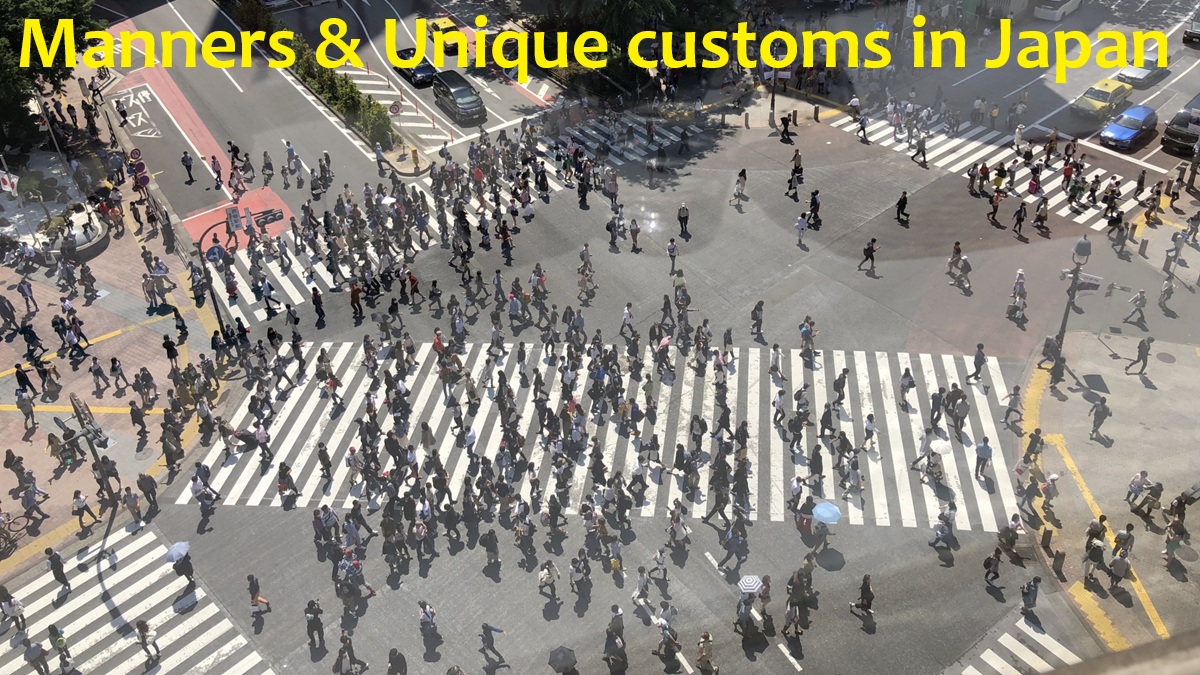Unique Customs in Japan
Japan has unique history and culture.
So, there are unique customs in Japanese people and society.
Of course, those may be different from the ones in your country.
But, when you travel around Japan, you should know and follow them.
Customs about lifestyle
Taking off shoes
Bathing naked
Disliked Tattoo
Native Religions
Umbrella
Customs about society
Bow
No tipping
Cars keep left
Customs about eating
Chopsticks
Free water
Appetizer in Izakaya
Holding up a bowl
Slurping noise
Unique customs about lifestyle
You must take off your shoes, when you enter Japanese house.
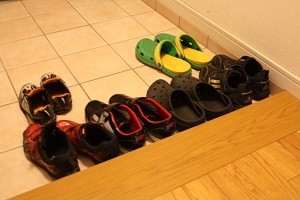
Shoes taken off in a Japanese house
Shoes are the implements to walk out of house in Japan.
You must take off your shoes at the entrance of Japanese house.
The structure of traditional Japanese building is based on such lifestyle.
We spend time in the house without shoes.
When going outside, we wear the shoes at the entrance.
You must get naked, when you enter a public bathroom.
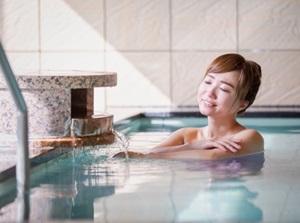
Taking a bath soaking naked body
Japanese people like to take a bath.
Especially, most people enjoy to soak own body up to the shoulders in the filled hot water.
At that time, both men and women get naked.
Wearing swimsuit in bathroom is senseless in Japan.
Even in public bath and onsen resort, the style is required.
Of course, the bathrooms for men and women are separated.
Most Japanese people dislike tattoo.
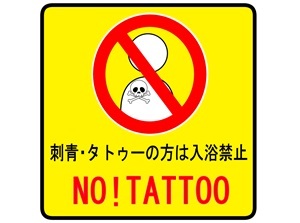
Image of no entry sign of tattoo at bathroom
In Japan, there were tattooed persons since from ancient times.
But from 1872 to 1948, tattoo had been prohibited by law.
After that, because only gangsters have been tattooed, most Japanese people think that tattoo is an antisocial thing.
Recently, tattoo as a fashion has been done among some people.
But it is said that the proportion is only 2% of all Japanese people.
Most Japanese people still have a bad feeling about even such tattoo and avoid the persons implicitly.
Therefore, it is said that some tattooed people regret the unerasable pictures on own body.
Probably, the feeling of Japanese people will not changed into the future.
You should know that even tattoo as a fashion makes a bad impression on most Japanese people.
In many public bathes, ryokan (Japanese-style hotel) and onsen (hot spring), tattooed person may be refused to enter a bath.
If you have a tattoo, maybe you shouldn't show it openly in Japan.
Most Japanese people have little interest in religion, but native Shinto and Buddhism are embedded in the daily life.
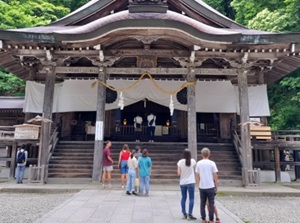
Worship at a Shinto shrine
It is viewed that the Japanese people have generally no religion.
But, Buddhism and Shinto are the native religions in Japan.
Buddhism is to believe in the teaching of Buddha, and Shinto is to worship many gods in the nature and heaven.
Japanese people depend on Buddha or the gods for the events and ceremonies in the life.
So there are very many Buddhist temples and Shinto shrines in all areas.
Funeral, wedding, visit the graves of ancestors, shrine visit for new baby and young child, visiting temple and shrine in the New Year, annual festival of shrine, etc.
Above important events and ceremonies are performed according to the manners of Buddhism or Shinto.
Japanese native Shinto and Buddhism are embedded in the daily life.
By the way, Japanese people have accepted even Christmas, Valentine's day and Halloween as pleasant events without religious meaning.
Japanese people are tolerant of the other religions.
Japanese people use an umbrella on rainy day.

Umbrellas on rainy day
I hear that many foreign people don't use an umbrella on rainy day.
But, most Japanese people use an umbrella on rainy day.
Japan have many rainy days and the mean annual rainfall is higher than global average.
And Japanese people dislike to get wet with rain.
So umbrella is a daily necessity for Japanese people.
Probably, the people without umbrella on rainy day are only outdoor workers wearing raincoat and some foreign tourists.
Unique customs about society
Japanese greeting is to bow.
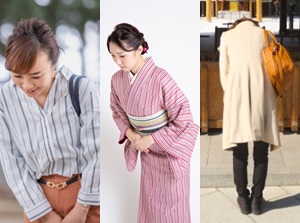
Japanese greeting is usually to bow.
Handshake and hug are used among very close friends, but that is not so common.
Bow is used on the occasion of "How do yo do?" and "Good-bye".
And it is also used on the occasion of "Good morning", "Good night", "Thank you", "I'm sorry", etc.
In a shop, after you have bought some goods, the clerk bow to you.
In any case, Japanese people bow very often.
Most people do the action unconsciously or reflexively.
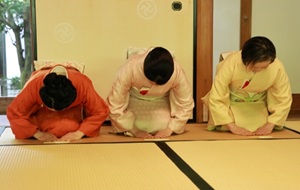
Japanese traditional cultures such as tea ceremony, flower arrangement, etc. need to bow.
And, in Japanese traditional sports such as Judo, Sumo, Karate, etc., the players must bow before and after the match.
In Japanese religions such as Shinto and Buddhism, bow is needed in the worshipping actions.
Bow is the act of showing your respect or gratitude for the person in front of you.
It is said that the original meaning was to express no hostility by stretching out your head which is the most important part of your body.
Formal bow is to bend your body forward deeply.
But in ordinary case, a slight bow is OK.
It is not customary to tip for service in Japan.
While you are in Japan, you need not give a tip.
Japanese people don't have the custom of tipping.
Even if you give a tip in Japan, most Japanese people probably decline that politely.
On the contrary, when we travel to foreign countries, we are puzzled by the custom of tipping.
Cars are driven on the left side of the road.
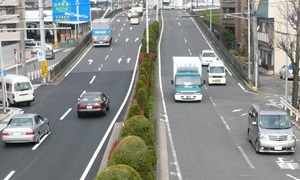
In Japan, cars must keep to the left side of the street and pedestrians to the right.
That is opposite to many countries.
If you are living in such country, you must be careful when you walk across the road.
Watch out for traffic when you walk around in Japan.
Unique customs about eating
Chopsticks are the main tools to eat Japanese food.
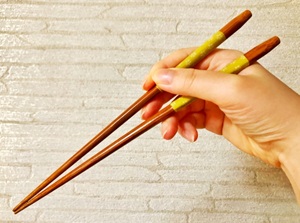
How to hold chopsticks
Japanese people use chopsticks to eat foods.
All Japanese people learn how to use chopsticks from childhood, so we can use them at will.
Chopsticks are the main tools to eat Japanese food.
Even in many Western restaurants, chopsticks are available.
To pinch the foods and to cut the foods are the usage of chopsticks.
But, to stick into the foods like a fork is a bad manner.
In most homes, each member of the family has own chopsticks.
So, chopsticks are one of favorite items.
For foreign tourists, chopsticks may be a Japanese souvenir.
In restaurant and cafe, a cup of green tea or cold water served at first is free of charge.

Free water brought by staff
Japan is water-rich country and drinkable and tasty water is supplied by the water-works.
In many restaurants and cafes, a staff brings a cup of water or green tea when coming to take the order.
The water or the tea is free of charge.
And, you can ask for a second helping during the meal.
Needless to say, never leave the restaurant without order of dish!
In Izakaya (Japanese style pub), the first served small dish which you don't order is included in the fee.
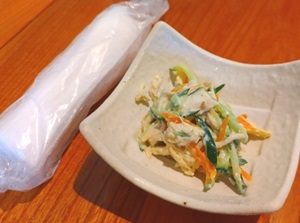
Served otoshi and wet hand towel
When you sit on a seat in Izakaya (Japanese style pub), the staff brings you chopsticks and wet hand towel for you and takes your order.
In many Izakayas, a small dish which you don't order is served at that time.
It is called "Otôshi" or "Tsukidashi" in Japanese, and it is an appetizer.
But, it is not a free service, and it is included in the fee.
It is a kind of table charge.
Most foreign visitors may feel dissatisfied with that, but that has been a traditional custom in Izakaya in Japan.
It is OK to eat Japanese foods with the bowl in a hand.
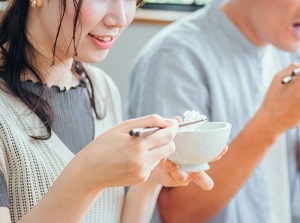
Eating rice by holding up a bowl
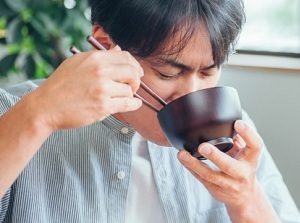
Drinking & eating miso-soup
Boiled rice is Japanese staple food and miso-soup is traditional soup.
These are the essence of traditional Japanese meal.
The foods are put in small bowls and served.
But, it is difficult to eat the foods in the bowl on the table with chopsticks.
I hold chopsticks on my dominant hand, so I can use the other hand to hold up a bowl.
I can put the rice into my mouth from the bowl near the mouth with chopsticks.
And, I eat Japanese soup from the bowl directly like drinking coffee from a cup.
Because, chopsticks can't spoon up liquid soup.
But large plates are never hold up.
Above way is only for small bowl or plate.
It is OK to make slurping noise when eating noodles.
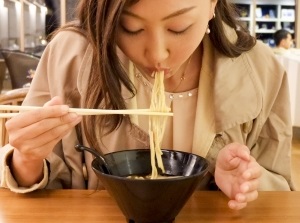
Slurping noise is OK
Udon, soba and ramen are the popular Japanese noodles.
Mainly, the noodles are in the soup.
I bring my face close to the bowl.
I pick up the noodle with chopsticks and draw the hot and long noodle into the mouth.
It is natural that slurping noise occurs at that time.
So, it is OK to make slurping noise when eating noodles.
It is not against manners in Japan.
Rather, smart noise gives the others an appetite.
It can't be helped if you are unpleasant, but that has been the received manner in Japan since ancient times.

